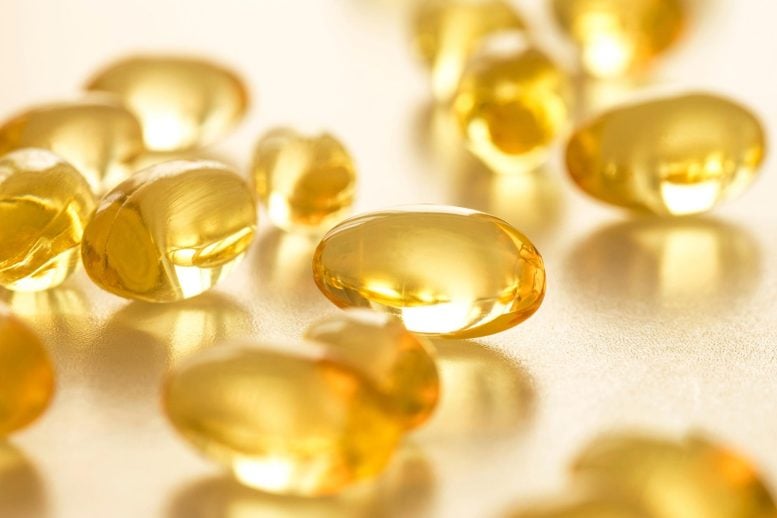
The largest-ever study on vitamin D supplementation in children, led by Queen Mary University of London and Harvard T.H. Chan School of Public Health, reveals that vitamin D supplements do not prevent fractures or improve bone strength in vitamin D deficient children, contradicting previous assumptions about the benefits of vitamin D on bone health.
A major clinical trial conducted by Queen Mary University of London in collaboration with the Harvard T.H. Chan School of Public Health has discovered that vitamin D supplements do not enhance bone strength or reduce the risk of bone fractures in children who are deficient in vitamin D. This research contradicts common beliefs about the impact of vitamin D on bone health.
Around one-third of children have at least one fracture before the age of 18. This is a major global health issue, as childhood fractures can lead to life years of disability and/or poor quality of life. The potential for vitamin D supplements to improve bone strength has attracted growing interest in recent years, based on vitamin D’s role in promoting bone mineralization. However, clinical trials designed to test whether vitamin D supplements can prevent bone fractures in children have not previously been conducted.
Study Methodology and Results
Working with partners in Mongolia, a setting with a particularly high fracture burden and where vitamin D deficiency is highly prevalent, researchers from Queen Mary and Harvard conducted a clinical trial to determine if vitamin D supplementation would decrease risk of bone fractures or increase bone strength in schoolchildren. The study, recently published in Lancet Diabetes & Endocrinology, is the largest randomized controlled trial of vitamin D supplementation ever conducted in children.
Over the course of three years, 8,851 schoolchildren aged 6-13 living in Mongolia received a weekly oral dose of vitamin D supplementation. 95.5% of participants had vitamin D deficiency at baseline, and study supplements were highly effective in boosting vitamin D levels into the normal range. However, they had no effect on fracture risk or on bone strength, measured in a subset of 1,438 participants using quantitative ultrasound.
Implications
The trial findings are likely to prompt scientists, doctors, and public health specialists to re-consider the effects of vitamin D supplements on bone health.
Dr Ganmaa Davaasambuu, Associate Professor at the Harvard T.H. Chan School of Public Health, said:
“The absence of any effect of sustained, generous vitamin D supplementation on fracture risk or bone strength in vitamin D deficient children is striking. In adults, vitamin D supplementation works best for fracture prevention when calcium is given at the same time – so the fact that we did not offer calcium alongside vitamin D to trial participants may explain the null findings from this study.”
Professor Adrian Martineau, Lead of the Centre for Immunobiology at Queen Mary University of London, added:
“It is also important to note that children who were found to have rickets during screening for the trial were excluded from participation, as it would not have been ethical to offer them a placebo (dummy medication). Thus, our findings only have relevance for children with low vitamin D status who have not developed bone complications. The importance of adequate vitamin D intake for prevention of rickets should not be ignored, and UK government guidance recommending a daily intake of 400 IU vitamin D remains important and should still be followed.”
Reference: “Vitamin D supplements for fracture prevention in schoolchildren in Mongolia: analysis of secondary outcomes from a multicentre, double-blind, randomised, placebo-controlled trial” by Davaasambuu Ganmaa, Polyna Khudyakov, Uyanga Buyanjargal, Enkhtsetseg Tserenkhuu, Sumiya Erdenenbaatar, Chuluun-Erdene Achtai, Narankhuu Yansanjav, Baigal Delgererekh, Munkhzaya Ankhbat, Enkhjargal Tsendjav, Batbayar Ochirbat, Badamtsetseg Jargalsaikhan, Davaasambuu Enkhmaa and Adrian R Martineau, 1 December 2023, The Lancet Diabetes & Endocrinology.
DOI: 10.1016/S2213-8587(23)00317-0









Often vitamin research is funded by drug companies to discourage use of vitamins which could reduce patented drug sales. Bones aren’t the only use the body has for D so this is a really stupid article.
I count 4 pharma companies and 3 nutritional supplement companies in the Declaration of Interests. Also, the NIH in the Acknowledgements — don’t throw the Vitamin D away just yet.
So Vitamin D alone does not increase bone strength or reduce fractures in children. Good science comes up with data like that, and it’s good data to have. I appreciate the doctor’s supposition that the lack of calcium supplementation could cause that finding. Still, I think they buried the lede, finding 95.5% of the 8,851 schoolchildren studied in Mongolia were deficient in Vitamin D. That initial finding could lead to some fascinating studies on the health and economic effects of Vitamin D supplementation. We could learn much about those other uses for Vitamin D, while at the same time helping people in Mongolia.
I found an obsolete study from 1998, “Prevalence of rickets in Mongolia” (Asia Pac J Clin Nutr. 1998 Dec;7(3/4):325-8), which found an exceptionally high occurance rate (69.8%) of symptoms of the soft-bones disease, making the headline here and most of the article dangerously stupid. The sensationalism written in by the Queen Mary University of London is embarassing. However, the study may have found useful data, and the included quotes at the end by Dr Ganmaa Davaasambuu and Professor Adrian Martineau were excellent.
HELLO! It does not work if it is not supported by adding calcium, or magnesium, or Vitamin K! Stop saying it does not work, when in reality they did not administer the Vitamin D correctly to begin with and even stated so in the report; “The absence of any effect of sustained, generous vitamin D supplementation on fracture risk or bone strength in vitamin D deficient children is striking. In adults, vitamin D supplementation works best for fracture prevention when calcium is given at the same time – so the fact that we did not offer calcium alongside vitamin D to trial participants may explain the null findings from this study.” . I hope whoever paid for the study to be done, gets their money back. You have failed to provide a truthful study to your readers. Shame on you.
The study is fine but the setup is lacking. It doesn’t seem like any other vitamin or mineral deficiencies were checked nor any hormones. Could be that vitamin D supplementation had no effect on bone density/fractures because the children were malnourished.
It would be interesting to see the same study but in a Western country – at the very least – and compare. Otherwise the study seems to have been done well. It’s just that it’s so isolated and in an extreme case population that it doesn’t seem like it is apples-to-apples comparable with other non-third-world populations.
There’s a similar study from South Africa but once again, it’s not a Western country so who knows if there is a major case of malnourishment from a vitamin and mineral perspective negating any possible difference from supplementation with vitamin D.
These types of studies don’t do much other than indicating that taken entirely out of context and looking only at the isolated supplementation, vitamin D has no effect on bone density or fracture risk.
Now if there was a somewhat frequent testing of blood work for vitamin and mineral composition as well as common hormones, then the study would be a lot more complete and a lot more interesting. But then the study wouldn’t be able to conclude much in a black-and-white manner and would be too open. But instead of looking for a single outcome of the axis of “has impact positive / has impact negative / has no impact”, perhaps a more open study would show more interesting things to then pursue in more studies with a more narrow focus.
Looks like this research is printed out by Chatbox. Based on outdated and erroneous data.
Vitamin D is important for immunity so if big pharma can get people to
take less they can sell more vaccine.
Just the headline “Shatters Myth” seems to be way over the top.
As others have noted, tough to build bones without calcium and magnesium; also vitamin K from nattokinase.
I think many persons got extremely good results on their health problems with vitamin d3 supplements at a higher dose. For them this study will not have any impact.
The need of the hour is to have a large scale study to recommend correct dose of vitamin d3 with magnesium supplement which will give people freedom from many ailments.